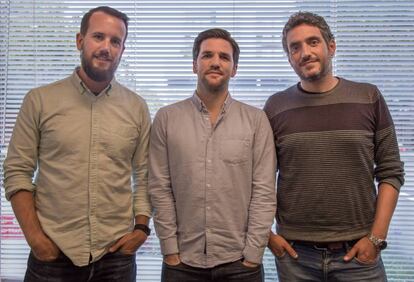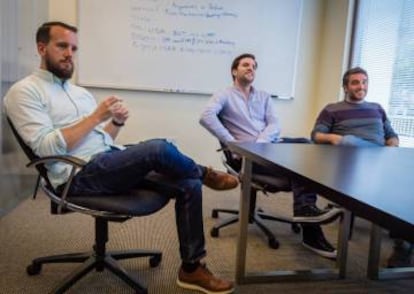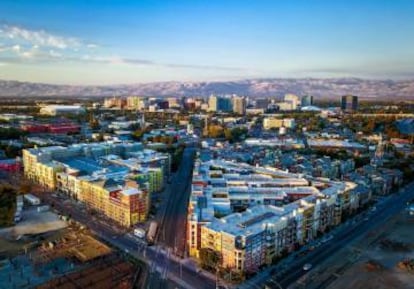Gate 93: Spain’s portal to Silicon Valley
Three Spanish techies create a fund to help Spanish initiatives survive in America’s startup mecca
Entrepreneurs arriving on this particular shore of the Pacific Ocean generally come armed with misconceptions as well as dreams. For this is San Francisco, a city built on the 19th-century Gold Rush – only now, those seeking gold come in the shape of startup entrepreneurs hoping to make it in cut-throat Silicon Valley.

Not everyone survives, of course. While there are fortunes to be made, there are many who fall by the wayside. Which is where Gate 93 comes in.
Enjoying a drink in an after-work corner of Silicon Valley, three friends were chatting about all the startups that had come from Spain only to go home again before their initiatives had got off the ground.
There is a clear premise at work: not all money has the same value
There was no shortage of examples. First, they contemplated the fate of the Madpixel startup by Koldo García, a company that offers a new way to experience art through tablet and smartphone devices. While it has continued to grow from Spain, their venture into Silicon Valley turned out to be a luckless affair.
Then they considered the case of Roser Solanes and Oriol Sanleandro, a young couple from Barcelona who set up Make Eat Easy, an initiative that seemed as fresh in San Francisco at the time as the food they delivered, complete with instructions on how to turn the ingredients into a dish. The idea was that each week busy people would be able to experiment with new recipes, without having to shop. As the ingredients were exact, waste would also be cut.
A win-win project? Apparently not. Suffering from a lack of funding, the nail in their particular coffin came with the arrival of Blue Apron, a listed company that was expanding its operations from the East Coast with no shortage of cash for advertising. Defeated, Solanes and Sanleandro bought their tickets home.

The experience did, however, teach them a lot about the logistics of food – packaging, conservation and distribution as well as recipes and consumer tastes. The couple became parents and Sanleandro is now general manager at Cabify while Solanes has set up a natural baby food company called Biotitos. Clearly, the venture was not in vain, but had there been more help at hand, things might have turned out very differently.
As conceived by the thirty-something trio – Javier Cortés from Valencia, Ibai García Urruchua from the Basque Country and Argentinian Juan José Feijoo – Gate 93 is a venture capital fund with an alternative twist named after the gate used by passengers flying between Spain and San Francisco.
The team
Initially the idea was to simply create a support network, which evolved into a mentoring consultancy. But after considering all the options, they decided it would be more effective to create a VC – venture capital initiative – the lifeblood of the sector.
Each non-executive member that has signed up to Gate 93 brings capital, knowledge and their network of professional contacts for recent arrivals to prepare them for this extremely competitive climate.
Many companies want to move here [from Spain], but there’s a lack of structure Ibai G. Urruchua, founder of Gate 93
The ‘three musketeers’ have plenty of experience between them. Cortés, who has lived in San Francisco for seven years, started out as a consultant with clients including Twitter and Yahoo! before joining Instacart – an online food delivery company where he was head of finance. It was there that he met Feijoo, a former Googler who was vice president of Instacart – he later moved to Adobe. While both were at Instacart, the company raised $400 million at a $3.4 billion valuation.
The third man, engineer García Urruchua, worked at Mozilla and Tok Box before switching this summer to Hearsay Systems.
Now, there’s a fourth player – Tony García Jiménez, one of Silicon Valley’s marketing wizards, who sold his first technology company 10 years ago. Since then, he has worked as an advisor and investor at Richmond Partners, targeting local companies as well as outfits in Spain and Latin America.
The method
Now these four heavyweights are attracting potential investors with a passion for analyzing data and backing viable startups.

There is a clear premise at work, however: not all money has the same value. This is something that you hear frequently in Silicon Valley and it is obviously the premise that Gate 93 is working on. For while there are many funds with greater financial scope, Gate 93 is the only one that knows how a startup might work in both Spain and Silicon Valley. According to Ibai, it’s all about the contacts. “Many companies want to move here [from Spain], but there’s a lack of structure. I have tried to help some coming from business schools such as IE or the Mondragón Team Academy, but there is a need for some form of official help,” he says.
Feijoo adds, “There are many who encourage them to come here, but there is no open-door policy when they do. We want to help, not just to appear to help,” he says.
And all three agree that it is payback time. “We want to give back what Silicon Valley has given us,” they say. “We are offering our time and experience as advisors because we believe that with capital, talent and support we can correct what needs to be corrected.”
English version by Heather Galloway.
Tu suscripción se está usando en otro dispositivo
¿Quieres añadir otro usuario a tu suscripción?
Si continúas leyendo en este dispositivo, no se podrá leer en el otro.
FlechaTu suscripción se está usando en otro dispositivo y solo puedes acceder a EL PAÍS desde un dispositivo a la vez.
Si quieres compartir tu cuenta, cambia tu suscripción a la modalidad Premium, así podrás añadir otro usuario. Cada uno accederá con su propia cuenta de email, lo que os permitirá personalizar vuestra experiencia en EL PAÍS.
¿Tienes una suscripción de empresa? Accede aquí para contratar más cuentas.
En el caso de no saber quién está usando tu cuenta, te recomendamos cambiar tu contraseña aquí.
Si decides continuar compartiendo tu cuenta, este mensaje se mostrará en tu dispositivo y en el de la otra persona que está usando tu cuenta de forma indefinida, afectando a tu experiencia de lectura. Puedes consultar aquí los términos y condiciones de la suscripción digital.








































